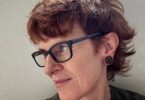“I’ve heard,” says Kristen, shifting gears as she pulls out of the ER parking lot, “I’ve heard that quadriplegics, they can get off to someone stimulating their ear. Is that what this was?”
“I’m not quadriplegic,” I say, wishing I’d had the foresight to puncture my left eardrum instead of my right.
“I mean was it, like, gratifying somehow.”
“Not like that.”
“Like that?”
“Not like anything. It hurt.”
She taps her index fingers on the steering wheel restlessly. “I’m just saying, ever since we were kids—”
“What, you mean the fingernails? Everyone does that.”
“And your scalp, too, and the acne—”
“Okay, okay, we don’t have to list them all,” I say, though I put my hand to my cheek, feeling the old scar tissue, under the pretext of leaning against the window.
“I really think Mom and Dad should’ve taken you to see someone about it. You know at Grandma’s one time I heard Aunt Alice telling Mom it was a form of self-harm.” She says this like it’s a familial revelation.
“Well, I haven’t killed myself yet, so it can’t have been that big of a deal.”
“Jamie!” she says. The car lurches as she shifts gears again. If I ever learn to drive, I think, I’m getting an automatic.
“Tell me honestly what it was about,” says Kristen, more gently.
“Nothing. It was just an accident. I’m embarrassed about it.”
Kristen clicks her tongue doubtfully.
What happened was this. A couple months ago I caught a bad head cold, the kind that plugs up your sinuses so bad you feel like you’re underwater. I got over it fine, but when the lingering cough had cleared up a week later, my right ear was still blocked.
I went to a drugstore. I intended to get ear drops to flush everything out, but in the same section they were selling these cute little double-sided earwax scoops, so I got those instead.
It hurt badly the first time I tried to get anything out. I lay in near dark for about an hour watching TV, working between ten minute intervals for as long as I could stand the pain. I droppered in hydrogen peroxide to loosen things up. I got out scoopfuls of gunk, wet and warm—infected, probably. In the morning I felt scoured. The world was impeccably clear.
When I could hear out of my right ear again—better, I thought, than I’d probably ever heard in my life—of course I was anxious to make my left ear match. The imbalance was intolerable. I never got anything like the goop from the right, but there was plenty of wax, dark amber, which I disposed of in a kleenex on my lap. I could hear better after that, but there was never any relief like the first time.
It got bad. I wanted to feel pure again, hollowed out. At night I would roll around in bed, listening to the crumbs in my inner ear rattle. The faintest tickle made me itch. It became a nightly (sometimes daily) habit: I would lie propped up on pillows at a forty-five-degree angle, numb to all other sensations, learning how to edge along the limits of that deep, red-orange ache I felt afterwards.
Yesterday night, though—it does embarrass me—I stuck the stupid scoop in too far. I knew at once something was wrong, but I took a Tylenol and went to bed. This morning there was pus coming out and I couldn’t hear. I cancelled classes for the day and took the subway to the ER. The vertigo got so bad I passed out at one point, so once I was cleared, the nurse told me I should call a taxi rather than risk public transit again. I didn’t call a taxi. I called my sister.
“Where are we going?” I ask Kristen.
“Work. I get off at five.”
“Can you drop me? I really just want to lie down for a while.”
“I thought we could get dinner after. And also,” she says, a tightness entering her voice that reminds me of our mother, “I don’t think you should be alone.”
“It’s not like I’m gonna stick something in the other one.”
“You took the day off, right? Watch a movie. You can sleep in the theatre if you want, I don’t care.”
Kristen is a middle manager at a chain cinema downtown. The pay and the benefits are pretty foul, but she gets the day shift on seniority, which, she tells me, is ideal: too few customers to have to deal with many complaints, and the kids working concession are all college age, so need less supervision. (I have something to say about college kids and independence, but resist the temptation.)
Three years ago at Christmas I berated Kristen for dropping out of business school. I did so because I loved her and worried for her, and because I was intolerably jealous of her capacity for carelessness. Since then, she’s gotten a promotion, while my doctorate has languished. We don’t talk about careers anymore.
Kristen navigates the underground parking lot jerkily. The cinema, crammed into a complex of other faux-luxury brands in the glitzier part of the city, is built vertically, three storeys of theatres stacked on top of each other. We take the elevator directly inside. I clutch my antibiotic ear drops with both hands.
The first floor holds the box office, an arcade, and a roped-off frozen yogurt stand. The games’ tinny theme songs echo in the empty space. At the box office, a girl leans over the counter, reading a book which she hastily slips under the till when she sees Kristen.
“Hi, Talia,” says Kristen, coming behind the counter. “How’s it going?”
“Good. Quiet.”
“The prizes are looking a little thin, if you need something to do.”
I watch Talia closely for a sign of disdain, but she’s poker-faced. She’s in her early twenties, and pretty—really pretty. I want to ask what she’s reading. She catches my eye and my face gets hot. I place my ear drops on the counter, then in my jacket pocket.
“I can take those, Jamie,” says Kristen. She pulls up something on the till. On my side, a list of movies appears on the screen. “Okay. This is what we’ve got.”
“What’s the emptiest?”
“In the Dark,” says Talia.
“Is that horror?”
“Yeah.”
“Whatever. You pick,” I tell Kristen. “Preferably something quiet, please.”
“Fine.”
“And put me on the left side, so I can hear.”
Kristen selects a seat, scans her employee pass, and prints off the ticket. “Thanks, Talia,” she says. “Call up when you need someone to cover your break.”
Kristen takes the ear drops out of my pocket and puts them in her purse. We step onto the escalator. “Do you want something to eat?”
“Maybe just a drink.”
There are three workers at the concession stand. They cluster around the central till, gossiping, but when they see Kristen they break off. “Hey, guys,” she says, passing through the employee-only door. “How are the stock levels?”
They’re mute. She gets me a large cup. “What do you want?”
“Root beer, please.”
Kristen hands me my drink as the workers try to look busy. They crack bags open with a flick of their wrists and shovel popcorn inside.
“Your theatre’s at the end. Number five. Text me if you need anything.”
“Okay. Thank you.”
The screen is dark when I enter the theatre, and I am alone. I find my seat—left side, near the door—and, sitting, close my eyes. It’s quiet. In the silence, I hardly notice the lopsided sensation in my head, the inclination to tilt my good ear toward incoming stimuli. My right ear still aches, but it’s a dull ache: the outer ear sore from being poked and prodded, by me and the nurses, the ruptured drum scratchy and irritable.
I take another Tylenol and wash it down with root beer. The screen flickers to life with pre-show ads.
All day, whenever I’ve had nothing else to do, I’ve been recounting the moment of the rupture to myself. I am treating it with the same delicacy I accord to memories of hookups: each point of contact is catalogued and filed sequentially.
There is—or was, it must be gone now; or it might never have been there in the first place—a niggling, crackly loose piece of wax in the back of my right ear, which had eluded me for weeks. I thought of it as lying in the southwest, down and back, around a bend in my ear canal. I had been trying to catch it from below, but nothing ever came out. For a change, I attacked from the top. I thought I could unwedge it from where it was stuck and roll it out.
The first pass got no progress. The second pass I thought, I shouldn’t have done that, and saw white.
When I had that first block, there had been a couple times I’d thought, distinctly, I shouldn’t have done that, but it was always followed by an almost caustic relief. There was no relief this time. The pain blistered, but it did not diminish. I did not feel gratified by its augmentation, from something I felt in the very centre of my skull, into a blossoming, ubiquitous excruciation.
But there had been a split second—and I regretting it as it occurred—where, simultaneous with the pain and then eclipsed by it a thousandfold, I felt—I can’t even say what: the tactile memory has no point of comparison, and yet loses no intensity for it, so that I think it may as well have originated from the synapses rather than terminated with them. The most direct explanation is that I had touched a sensory receptor which had never been touched before, and the surprise of experiencing somatic pain in so remote an area of my own body magnified the sensation. How often are you aware of your own eardrum?
The movie begins at last. I counted three or four other people coming into the theatre during the trailers—two a couple, and two, like me, alone.
The movie is about a man who makes it his life’s mission to build an amusement park in his hometown. In the first scene, as a young boy, he goes tobogganing with his little brother and breaks his arm when the toboggan flips over a snowbank. Later, he tries to impress a girl by showing her the homemade roller coaster he and his brother have built in their backyard, only for the rotting wooden planks to collapse beneath him. She cries out: this is how we learn she loves him. As she rescues him from the rubble, their eyes meet, and they kiss for the first time.
I look away; I have always looked away for kissing scenes. My root beer gives me brain freeze. I press my tongue to the roof of my mouth.
When I was really little, younger than five, I remember believing that my tongue was the manifestation of my soul. No one suggested the idea to me; I don’t think I even knew to call it a soul. I simply felt, with certainty, that the part of me that was the most me was my tongue. I knew what the brain was, but I couldn’t feel it, and I only became aware of other body parts in activity or pain. The tongue, so far as I could tell, was the only organ of both sensuality and will, the closest thing I could find to a self.
Just now, though, I am coming to believe that my soul resides just behind the small, perforated curtain of my right eardrum.
I can’t not think of it. I can hear, or maybe feel, my pulse—cells on a current of blood flooding in to repair the damaged skin, a torrential scarlet rush. The surround sound only amplifies my discomfort. Onscreen, the man pours champagne at his wedding, and the post-production pop of the cork makes me jump.
I leave the theatre, but when I open my phone to text Kristen, the battery, drained from scrolling Twitter at the ER, dies immediately. I look around at the concourse of theatres, stupefied. I don’t know where her office is.
I wander back to the concession stand. The employees cast glances at me, but none speak until I approach a till.
“Do you know where Kristen is?” I ask, embarrassed at the thinness of my voice.
“I think she’s in the office,” says the employee, a fit college-age guy, the kind that scares the shit out of me when I have them in first year seminars.
“Um, could you ask her to come here?”
The guy turns around and speaks into a walkie-talkie. “Kristen, could you please come to concession, a guest would like to speak to you.”
I wonder if she’ll come out in full “yes, you can speak to the manager” mode, but she doesn’t look surprised to see me. I pull her aside, not daring to look at the concession workers.
“Can you give me my ear drops?” I ask her.
She shifts her weight, puts her hand on her hip. “What do you need them for?”
“My ear.”
“Are you gonna take them right now?”
“Yeah.”
“Should you do that? How often are you supposed to take them?”
“Twice a day. But they didn’t give me any at the hospital.”
She purses her lips. “I feel like I’m enabling you.”
There’s not much I can do to defend myself, so I say nothing. “They’re in my purse. I’ll be right back,” says Kristen.
I prop myself up against the condiments stand opposite concession. I forget my phone’s dead, try to check it, and put it back in my pocket. I can’t tell if the employees are pretending not to look at me or actually not looking.
Kristen returns and presses the drops into my hand. “Listen,” she says. “I think you should get assessed for OCD.”
“Thanks.”
My sister has a keen way of weaponizing psychology. When she was in high school, instead of calling me psychotic, she would tell me to go to therapy.
I don’t have OCD, nor am I a germaphobe. And I don’t really like pain. But labels like those are easier—even for me, sometimes—than acknowledging the truth, which is that I am deeply, inexplicably weird.
In the bathroom, I stand over a sink while I uncap the ear drops. Tipping my head to the left, I meet my own eyes.
Kristen asked me if it was sexual. The sensation wasn’t orgasmic, but I can’t deny the presence of a certain autoeroticism. I remember thinking, so many of our interactions with our bodies are about filling them—plugging orifices, stuffing bellies; I am doing what no one can do for me. I am trying to hollow myself out.
My reflection and I administer the dose. Five drops. When I straighten my neck, excess fluid streams out of my ear, trickling down to my jugular. The medication is clear but viscous. I put my forefinger to where it has pooled below my earlobe and rub it between my finger and thumb. I don’t feel hollowed out. I feel glutted and sedate.
It seems to me that nearly everyone has a point in their life where they think, I can’t go on living like this. So they get a divorce or start a keto diet or delete their social media or drop out of business school and then, invariably, they do. Maybe it’s all anyone can stand to do: a tiny pinprick in the fabric of reality, a rupture the size of a grain of sand.
Upon my return to theatre five, the couple has disappeared, leaving the three of us alone. The man and his new wife are in a dark ride, an old-fashioned tunnel of love. Water laps at the sides of the rickety boat as they argue in whispers.
Later, the movie will try to tell us that he’s a great man, one who does audacious and risky things because he’s an entertainer, a visionary. But I know better. He makes roller coasters because they’re a way for him to be in his own body.
A half-circle of brilliant light is punctured by their silhouettes. The ride comes to an end; the boat leaves the tunnel the same way it entered.
 Gene Case is a second-year student at Trinity College in the University of Toronto, studying English and Literature & Critical Theory. Their writing has appeared in Blank Spaces, Jelly Bucket, and Acta Victoriana. They are from Ottawa, Ontario, by way of Sault Ste. Marie.
Gene Case is a second-year student at Trinity College in the University of Toronto, studying English and Literature & Critical Theory. Their writing has appeared in Blank Spaces, Jelly Bucket, and Acta Victoriana. They are from Ottawa, Ontario, by way of Sault Ste. Marie.






